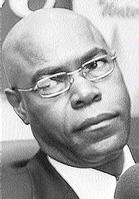
E.G. Hunter, president of the National Water Commission. - File
The National Water Commission (NWC) will head to the international capital market to raise US$18 million (J$1.19 billion) to finance a new component of its ongoing Martha Brae project.
The water agency has already selected the French company, Sogea Satom as contractors
for the job, with the approval
of the National Contracts Commission, but is awaiting Cabinet approval before hunting down the funds.
"We're at an advanced stage of negotiation with Sogea," said NWC president E.G. Hunter, referring to the additional work to be undertaken.
Hunter said the job, which is being treated as an amendment to the scope of works on the Martha Brae treatment plant rehabilitation and pipeline-
laying project contracted
to Sogea and its subsidiary Water Management International (WMI), will see an extension of pipelines to areas of Trelawny not covered in the initial
contract.
The two-year project, started in May 2005, originally called for the laying of 30,000 metres of pipeline over a 22 kilometre stretch, from Martha Brae to Braco.
Substantial repairs
The French contractor has done substantial repairs to the water plant, which was locked down for two months. It is now laying the pipes, said Hunter, at a rate of 250 metres per day, completing more than 6,000 metres so far.
Hunter, an engineer, declared himself pleased with Sogea's progress last Friday, saying the fixed-price US$40 million (J$2.6 billion) project was on target and the work was proceeding without incident.
Under its current contract Sogea will double water supply in the area to six million gallons daily by lifting supplies from the Martha Brae river and Queen of Spain Valley wells. It is also building two reservoirs, at Spring Hill and Harmony Hall, and laying secondary pipelines to communities to be served by the system.
NWC's plan to go to the capital markets for the additional US$18 million will likely mimic the method used to raise the original contract sum, which was partly financed with commercial bank loans and partly with buyer credit brokered through BNP Paribas, one of France's largest banks resulting from the May 2000 merger of Banque Nationale de Paris and Paribas.
Commercial loan
The BNP financing, which approximated US$20 million repayable in 7.5 years, included a commercial loan of €6.02 million, Spanish buyer credit of €3.8 million repayable at 4.21 per cent, and French buyer credit of €6.6 million repayable at 4.46 per cent.
The other US$20 million was a loan from the Michael Lee Chin-owned National Commercial Bank at a fixed 8.5 per cent and repayable in 11 semi-annual instalments of US$1 million, plus a final payment of US$9 million.
Hunter said the water commission would service the loans - which have an 18-month moratorium on principal repayments - from NWC revenues.
To manage the foreign exchange risk and hedge against currency movements - the Jamaican dollar declined 4.6 per cent relative to the U.S. dollar over the 2005 calendar year - the water commission has established a sinking fund, from which it will finance loan repayments, and has invested J$100 million so far in euro-denominated securities with different financial institutions.
Investments in the sinking fund are "subject to cash availability," Hunter told the Financial Gleaner. He was unable to comment immediately on the level of returns
generated on the investments,
saying it would require calculation.
The sinking fund mirrors the insurance fund that NWC has with Citibank NA, which it draws on to repair disaster-related damage to its systems.
"The key strategy to recover from disaster is to have liquidity somewhere," said the NWC president.

